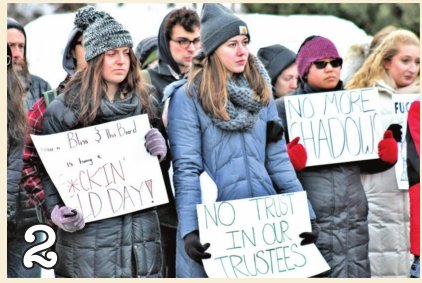What a year.
Lansing Mayor Andy Schor took office.
Michigan elected a new governor. The election also shifted some key legislative tides as citizens rushed to the polls and passed several important statewide initiatives. Development has also been booming.
Important stories abounded, among them: The fiery death of a mother and child in public housing in Lansing, which led to replacing the head of the Lansing Housing Commission and a hard look at conditions; voter approval of a $70 million millage for a justice complex that includes a new county jail; renewal of the farmland millage to allow the county to continue to building a greenbelt to limit sprawl; and announced plans for the redevelopment of the Waverly Golf Course.
Before we charge into a new year, here’s a glance back at the most newsworthy items from 2018:
 1.) Marijuana advances
1.) Marijuana advancesVoters, 56 percent to 44 percent, passed Proposal 1 in November. Possession and adult use of marijuana — after several dogged years of advocacy efforts from across the nation — were finally legalized by December. And it was only because citizens stepped up, went to the polls and decided to embrace the long-awaited change.
(City Pulse also passed out free joints near the State Capitol to usher in the new era of legalization.)
Commercial sales of recreational weed are still at least a year away, but strides were also made on the medical side of the rapidly expanding industry. Michigan’s Medical Marihuana Licensing Board doled out its first operating licenses to dozens of dispensaries, growing facilities and other pot-related operations over the last 12 months.
Lansing also became home to its first locally licensed dispensaries after City Clerk Chris Swope reconsidered a controversial court order and granted conditional approval to several nearby shops. Legal battles were also waged against the state and the city while entrepreneurs continued to navigate the complexities of the licensing process.
East Lansing and Meridian Township also dipped their toes into the lucrative waters of retail medical marijuana, taking steps that could eventually license several facilities throughout the Greater Lansing region. But as the industry toddles its way out of infancy, challenges within the fledgling statewide market are likely to continue.
Said Robin Schneider, the finance director for the Coalition to Regulate Marijuana like Alcohol, the organization that led the success campaign for Proposal One:
“The war is over but the battles will certainly continue along the way.”

The investigation and subsequent sentencing of the former Michigan State University sports doctor shook the campus community to its core.
On Jan. 24, Ingham County Circuit Judge Rosemary Acquilina sentenced Nassar to 40 to 175 years of sexual assault involving hundreds of women and girls.
Survivors poured into the courtroom. Former university leaders were roped into the scandal. Nassar will spend the rest of his life in prison. Local communities are still reeling from the trauma but advocates for change aim for a brighter future.
The same day, Lu Anna Simon, MSU’s president for 13 years, resigns. Ten months later, Simon is charged with four counts of lying to a peace officer investigating Nassar in Eaton County, where the sports doctor was also sentenced.

Mayor Andy Schor developed a bit of catchphrase this year. “Lansing’s time is now,” he’d often say. And as development continues to boom in and around the capital city, others have caught on to the tired tagline.
Development titan Pat Gillespie, adored (and sometimes despised) for his knack of transforming city blocks into entrepreneurial powerhouses, launched plans for a grocery store on Michigan Avenue. It aims to provide an oasis within an expansive food desert and will include apartments and the first new downtown hotel in years.
Brent Forsberg, another local development guru, plans to open another hotel in REO Town. A $242 million development at the site of the former Red Cedar Golf Course also crept closer to construction after city officials sold off the land. Another mixed-use development charted a course to the former Waverly Golf Course.
Lansing officials also approved the redevelopment of the old YMCA site and the Oliver Towers building downtown, as well as a major warehouse reconstruction in the Hazel-Hosmer corridor. On the southside, a new housing complex is taking shape at the old Harley Hotel. Changes are also en route to the former EDS building.
McLaren Greater Lansing broke ground on a new, $450-million hospital supercomplex near Michigan State University. The Lansing Board of Water & Light made strides on the controversial Central Substation. Additional housing projects chugged forward at Provident Place and the former Michigan School for the Blind.

Discussions to consolidate Lansing and East Lansing’s 54A and 54B district courts with Ingham County’s 55th District Court have started and stalled for more than 20 years. But officials think the latest iteration to integrate justice into one countywide system might just have enough momentum to be forged into reality by 2020.
A bill that allows for but does not require consolidation made its way through the state Legislature last week, giving officials a year to work out the details. Early proposals suggested each jurisdiction could eventually save on operational costs. Judges would eventually shift to a countywide electorate under the plan. New courtroom facilities could be constructed.
Some have criticized the plans. 54A Judge Hugh Clarke, for instance, said it would make it more difficult for people of color to serve on the bench. Others have suggested the expected cost savings are inflated.

A recall election at Williamston Community Schools ultimately stripped the district of its board president and ignited a community debate over policies to protect transgender students. Yard signs lined the streets as an often hateful debate over parental rights rocked the sleepy little town.
Some parents were simply intolerant of transgender lifestyles. Others, backed by the Bible, claimed their religious beliefs clashed with the district policies. Many more took issue with policy language that essentially gives administrators discretion over whether parents should be involved in their student’s gender transitions at school.
Three trustees survived the recall effort, but former board president Greg Talberg was unseated by challenger Karen Potter — an opponent to the board’s controversial transgender policies. As a result, there could now be enough support to reel back those protections or eliminate them entirely over the next year.

Officials in Lansing and East Lansing are still scrambling to regulate electric scooters after they popped up on street corners without much (if any) prior notice in the fall. Meanwhile, companies like Lime and Bird, have cashed in on the Greater Lansing market as hundreds of scooters suddenly became available for local residents.
Some have embraced the scooter surprise. They offer a convenient and affordable way to travel around town and help to solve the “last-mile problem” — the final leg to a bus stop or another mode of transportation. Others have complained about the sheer number of them, often littering sidewalks in front of local storefronts.
Lansing crafted a licensing agreement. Michigan State University has impounded dozens of scooters. East Lansing, among other cities across the nation, have tried (and failed) to have the companies pull them off the streets. Like them or not, it appears the scooter rental market has arrived and doesn’t plan to leave anytime soon.

The saga of the City Market neared its end. It was born in controversy when the Bernero administration sold the site of the 1938 market to the Gillespie Group for his Marketplace Apartments in 2009. And the administration faced ridicule for replacing it with a pole barn on the river. Though built, the people did not come.
This year, The City Council slashed the underused market’s subsidy, prompting the administration to announce plans to close it as a market and entertain proposals for new use. Its last tenant, Waterfront Bar & Grill, which is embroiled in a lease battle with the city, just announced plans to move to REO Town.

When Mayor Andy Schor took office in January, he inherited plans from his predecessor, Virg Bernero, to allow a developer to renovate the old Lansing State Journal building into a new city hall. In turn, the current facility would become a luxury hotel. The plans were stalled, but Schor has continued to push new concepts forward.
Over the last few months, Schor has grown increasingly willing to consider construction plans long before officials decide where to eventually house the 54A District Court and the Police Department lockup that share space in the building. He also recognized that development pressures are “a factor” in the renewed urgency.
All options remain on the table, but Schor also suggested Lansing could someday build itself a new city hall on the long-undeveloped Seven Block Property along Martin Luther King Jr. Boulevard behind the Capitol. Property owner Sam Eyde is eager to sell the land but he said there haven’t been any meaningful discussions.

Ingham County, following recent standards from the Michigan Indigent Defense Commission, took steps this year to launch a countywide Public Defender’s Office. Assistant Prosecutor Russel Church was appointed as chief public defender and officials said the office has the potential to change the face of the criminal justice system.
At least 37 employees — including 26 attorneys — will eventually be hired to work in the office following a $5.6 million cash infusion from the state. The county now appoints private attorneys to defend those who can’t afford to hire their own. The public defender’s office is designed to streamline and enhance that representation.
An ethical dilemma also surfaced when County Commissioner Carol Koenig resigned to apply for the gig. Ethical guidelines discouraged commissioners from hiring a former colleague but concerns fizzled when the board ultimately decided to appoint Church instead.
Koenig now plans to return to the board in January.
 10.) State’s first pro soccer team in Lansing
10.) State’s first pro soccer team in LansingTom Dickson, the owner of the Lansing Lugnuts, in October announced the formation of the Lansing Ignite soccer team, slated to hit the field at the Thomas M. Cooley Law School Stadium in March.
A licensing agreement ensures the team will remain in Lansing for 16 years.
The season — part of USL League One — is an offshoot of the United Soccer Federation. It’ll run simultaneously with baseball and will include at least 15 home games. The Lansing Entertainment and Public Facilities Authority will subsidize sod conversions, as the field repeatedly flips format from baseball to soccer.
Officials touted the upcoming soccer season as a way to drive new revenue into the city and tap into underserved crowds of regional soccer fans. The deal, however, required city officials to dole out as much as $625,000 in marketing costs among other fees to promote the stadium — eventually tallying to more than $3 million in total.
Schor suggested the return will be well worth the investment as soccer fans statewide converge on the capital. Besides, many of those costs baked into the agreement were already being paid to support the Lugnuts’ minor league baseball team.
kyle@lansingcitypulse.com
Support City Pulse - Donate Today!
Comments
No comments on this item Please log in to comment by clicking here